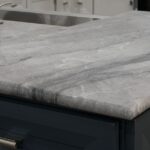You all know the main qualities of quartz surfaces, they’re extremely durable, scratch and stain-resistant, require no maintenance, and with simple day-to-day cleaning, they can look good for decades. But what if they start to lose their luster? Do those “polishing” products work? Can polishing remove chemical stains that might happen? And how to polish quartz countertops after all?
For a quick run down, what we recommend is:
- Try doing a more thorough and forceful cleaning with water and neutral detergent before going for a polish
- Do not use abrasives or strong products to clean it
- If water and detergent don’t work, try a stronger product that’s appropriate for quartz
- If all else fails, you’ll need to give your quartz countertop a complete surface polish
Read on to learn more!
Understanding What Polishing Means
The first thing you will notice is that the term “polishing” is used very loosely nowadays. It can either mean chemical, topical polishing, or physical, hard polishing (the one with the diamond pads rotating at extremely high speeds).
Both aim at creating a smooth and shiny surface, but they try to achieve that in different ways. A chemical polishing process creates a thin layer over the surface that reflects light more strongly. The goal is making similar to a wet look that won’t dry off so soon. It does, however, fade out over time.
A physical polishing, on the other hand, actually changes the surface of the material, making it lustrous permanently. That’s why polishing, under this light, is called a type of surface finish.
So, you get that there are 2 types of polishing out there. But when should you use one, and when should you use the other?
The answer is most likely you don’t need to use any of them.
When do you need to polish quartz countertops?
Here are some things people sometimes don’t get.
- Quartz slabs are already permanently polished from the factory, unless you order it with a different surface finish.
- Quartz’s polished surface finish will not wear off over time unless you damage it.
So, you only need to perform physical polishing again if you need to resurface your countertops due to damages or permanent stains.
Chemicals such as bleach, lemon juice, vinegar, and strong cleaners can damage quartz by discoloring or bleaching out the resin binding the quartz materials together. Yes, quartz can stain, so you have to be careful.
If that’s the case for you, we will talk about refinishing your quartz countertops later on in this article.
On the other hand, polishing products manufacturers claim their chemicals are able to enhance the color and luster of your already polished quartz surface. Well, we’re not entirely sure that’s helpful.
If you feel like your quartz countertops are not shining the way they were when they first arrived, but they are not damaged, then read on.

How To Polish Quartz Countertops To Restore Their Luster
As we’ve mentioned, quartz polishing finish is permanent, unless physically or chemically damaged. So, how come a perfect-looking quartz countertop can lose its luster? Well, according to quartz specialists, most likely it just needs a more thorough cleaning.
Maybe you can’t see any dust, but there’s a really thin layer of dirt being formed and making your surface look dull. The good news is, in order to make it shine again, you just need a robust cleaning.
To clean quartz, you won’t need any fancy cleaner. If they’re made for quartz, though, there’s nothing wrong with using them. However, there’s also nothing wrong with using water and neutral dishwasher detergent either.
Maybe you already clean your quartz surfaces every day, but this time, do it harder. Give it a thorough scrub with a sponge, just be careful not to use abrasives (that includes the green side of common dishwashing sponges).
After thoroughly cleaning your quartz countertop, you need to rinse it too, to get rid of all the soap. We tend not to think about that, but soapy residues also create a hazy layer over countertops.
If that process isn’t enough, you can try one of those fancy cleaners. And if nothing works, then we’re sorry to say, but your surface has been somehow damaged.
So, head on to our last section to learn about resurfacing.
What about polishing products?
As we’ve previously mentioned, you should think about those as color enhancers. If you’re unsatisfied with how your quartz is still looking after cleaning, then sure, you can give them a try.
However, don’t think of them as a replacement to the procedure we’ve described above. If you try to apply a product that will leave a layer on top of an already existent dirt layer, it’s likely the results will be an even hazier surface.
How To Polish Quartz Countertops To Repair Scratches, Stains And Discoloration
Yes, it’s possible to polish quartz countertops in such a way as to repair scratches and stains. However, unfortunately, we have to mention that it isn’t as easy as you’d like it to be. You can’t, or at least shouldn’t, do it at home.
We’re talking about giving quartz a new surface finish, repeating what was done in the factory. The stains and discolorations will be gone, not because they were removed, but because a tiny fraction of the surface will be removed.
We would love to be able to say there’s an easy fix, like with marble. Marble is so soft you can get rid of scratches and etching with polishing powder. But quartz is a very hard material, and it can only be resurfaced the way granite is. Diamond pads, power grinders, and everything.
Only it’s harder to resurface quartz. It takes more time, it takes more experience, pieces of equipment that are more expensive, and in the end, it might not be worth it, since some chemical stains in quartz are able to go really deep. That doesn’t mean resurfacing your quartz isn’t a good fix, it might be, but it should be your last resource call.
As you’ve noticed, polishing quartz is not a do-it-yourself task. Luckily, most of your quartz-related problems will be solved with cleaning, so don’t give up hope just yet.

Count on professionals to help you
If you’re having trouble with your quartz or natural stone surfaces and you live around Sarasota in Florida, you can count on us to help you. Just reach out to us and our stone and quartz experts will be happy to help you.
FAQ
To give your quartz countertop its old shine back, make a mix of 1 part vinegar 3 parts water. With the help of a spray bottle and a microfiber cloth, spray the mixture on the countertop and polish it until you get the shine you want.
Buffing and polishing can sometimes fix the lightest scratches. However, the deeper scratches can only be fixed by filling them with epoxy or resin.
Yes. But be careful. Although not as acidic as other substances, the excess use of baking soda can stain the quartz.
To prevent quartz from staining, the best course of action is to avoid direct contact with liquids as much as possible. As soon as a spill occurs, wipe away immediately with a dry cloth.



